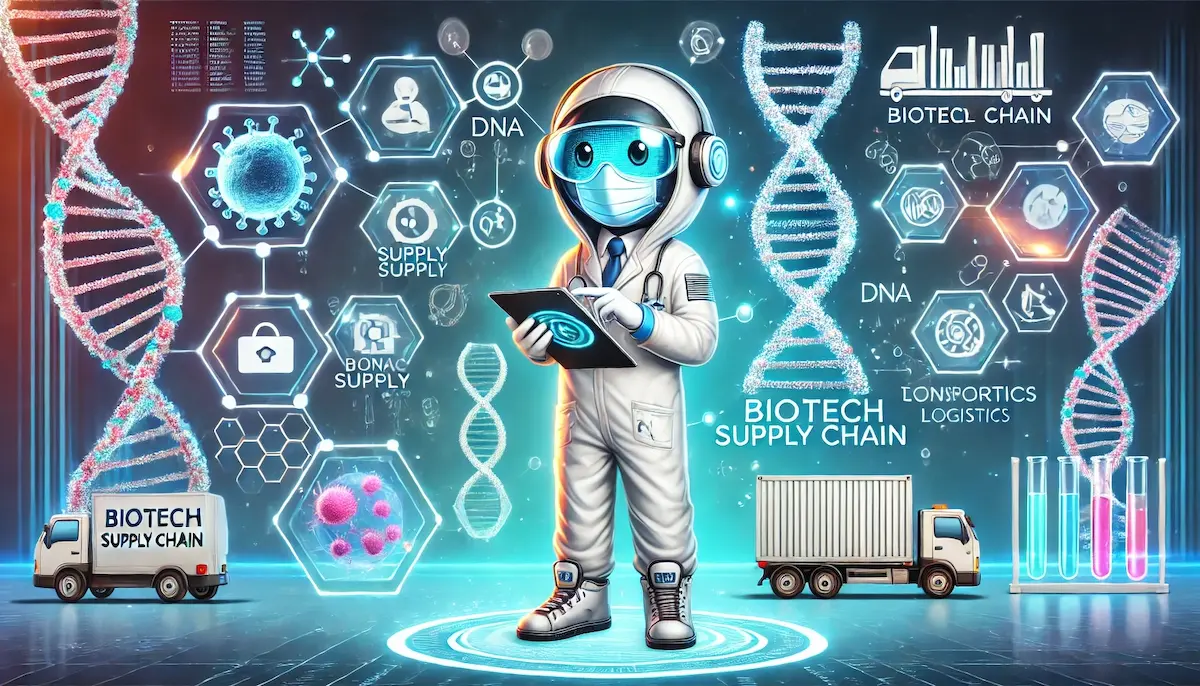The biotech supply chain is a vital network that supports the production, distribution, and delivery of biotechnology products, including pharmaceuticals, vaccines, and biologics. Given the complexity and sensitivity of these products, the biotech supply chain must be meticulously managed to ensure that these critical products reach patients safely and efficiently. Let’s explore the key elements of the biotech supply chain and its importance in the industry.
What is the Biotech Supply Chain?
The biotech supply chain refers to the entire process that starts from sourcing raw materials and extends through manufacturing, quality control, distribution, and delivery of biotechnology products. This supply chain is characterized by its complexity, as it involves handling sensitive biological materials and complying with stringent regulatory requirements.
Products in the biotech supply chain often require special handling conditions, such as cold storage, to maintain their efficacy and safety. The supply chain must also be agile and responsive to changes in demand, particularly in times of health emergencies like pandemics.
Key Components of the Biotech Supply Chain
Several critical components define the biotech supply chain:
Raw Material Sourcing
Biotech manufacturing begins with sourcing high-quality raw materials, such as cells, growth media, and specialized chemicals. These materials must meet strict quality standards to ensure the safety and efficacy of the final product. Sourcing raw materials often involves working with a network of suppliers, each of whom must be thoroughly vetted and monitored to maintain supply chain integrity.
Manufacturing
Once raw materials are secured, they are used in the production of biotech products. Manufacturing in the biotech industry is highly regulated and involves complex processes, including cell culture, fermentation, and purification. The manufacturing stage must adhere to Good Manufacturing Practices (GMP) to ensure product quality and compliance with regulatory requirements.
Cold Chain Logistics
Many biotech products, such as vaccines and biologics, require temperature-controlled environments during storage and transportation, known as cold chain logistics. Maintaining the cold chain is crucial to preserving the stability and potency of these products. Breaks in the cold chain can render a product ineffective or unsafe, making this a critical aspect of the biotech supply chain.
Quality Control and Assurance
Throughout the supply chain, rigorous quality control (QC) and quality assurance (QA) processes are in place to ensure that products meet the necessary standards. QC and QA involve regular testing, monitoring, and documentation at each stage of production and distribution. These processes help prevent issues such as contamination, degradation, or non-compliance with regulations.
Distribution and Logistics
After manufacturing and quality checks, biotech products are distributed to hospitals, pharmacies, and other end-users. This stage involves coordinating transportation, storage, and delivery to ensure that products reach their destination safely and on time. Given the sensitive nature of biotech products, logistics must be carefully managed to avoid delays or damage.
Regulatory Compliance
The biotech supply chain is subject to extensive regulatory oversight from agencies like the FDA, EMA, and other global regulatory bodies. Compliance with these regulations is critical at every stage of the supply chain, from raw material sourcing to final delivery. Non-compliance can lead to penalties, product recalls, or the suspension of operations.
Risk Management
Risk management is a crucial component of the biotech supply chain. This involves identifying potential risks, such as supply shortages, transportation delays, or regulatory changes, and developing strategies to mitigate these risks. Effective risk management helps ensure the continuity and reliability of the supply chain, even in challenging circumstances.
Importance of the Biotech Supply Chain
The biotech supply chain is essential for several reasons:
Ensuring Patient Safety
The biotech supply chain plays a direct role in ensuring patient safety by delivering products that are effective and free from contamination. Proper handling and storage throughout the supply chain are critical to maintaining the safety and efficacy of biotech products.
Supporting Public Health
A well-functioning biotech supply chain is vital for public health, particularly during health emergencies like pandemics. The ability to rapidly produce and distribute vaccines, treatments, and diagnostics is crucial for controlling the spread of disease and protecting public health.
Enabling Innovation
The biotech supply chain supports the innovation that drives the biotech industry. By ensuring that new products can be manufactured and delivered efficiently, the supply chain enables companies to bring new therapies and treatments to market quickly.
Economic Impact
The biotech supply chain contributes significantly to the global economy by supporting jobs, driving technological advancements, and enabling the production of high-value products. A robust supply chain is essential for the competitiveness and growth of the biotech industry.
Managing Global Reach
Biotech products are often distributed globally, requiring a supply chain that can navigate international regulations, manage cross-border logistics, and handle diverse market demands. A global biotech supply chain must be adaptable and efficient to meet these challenges.
Conclusion
The biotech supply chain is a complex and critical network that ensures the safe and efficient production and distribution of biotechnology products. By maintaining high standards for quality, compliance, and logistics, the biotech supply chain plays a vital role in protecting public health and enabling medical innovation.
Blockfine thanks you for reading and hopes you found this article helpful.
